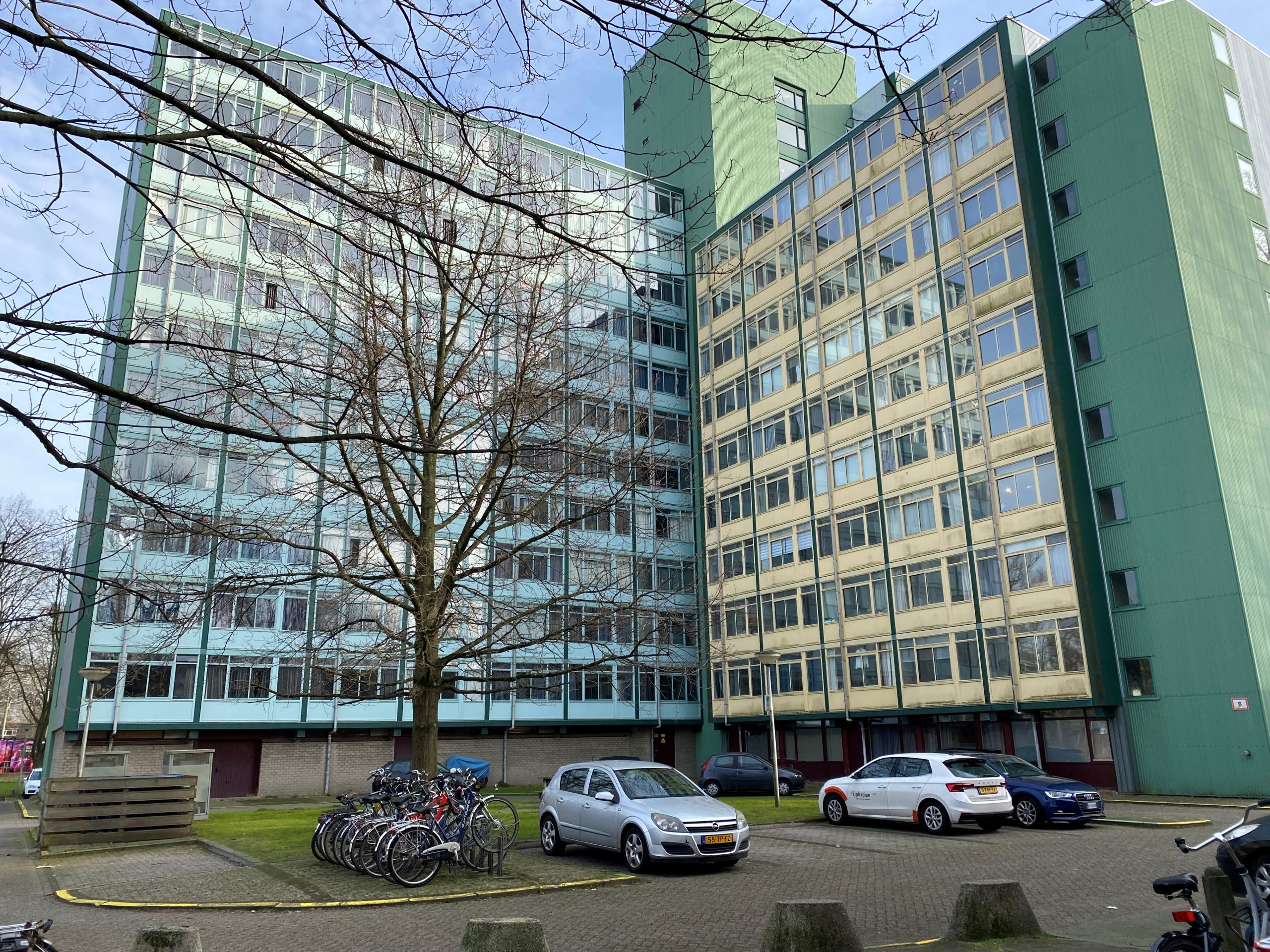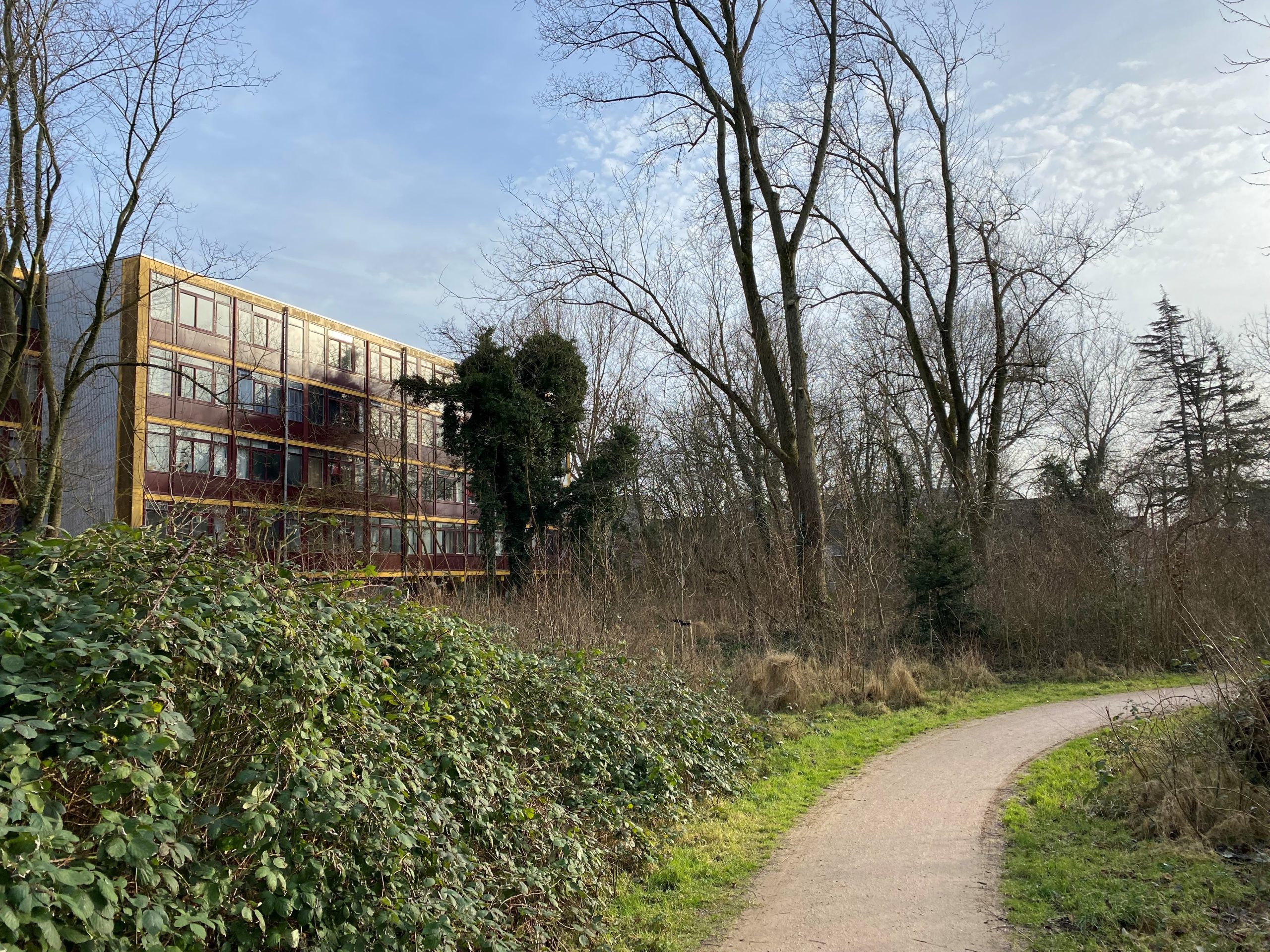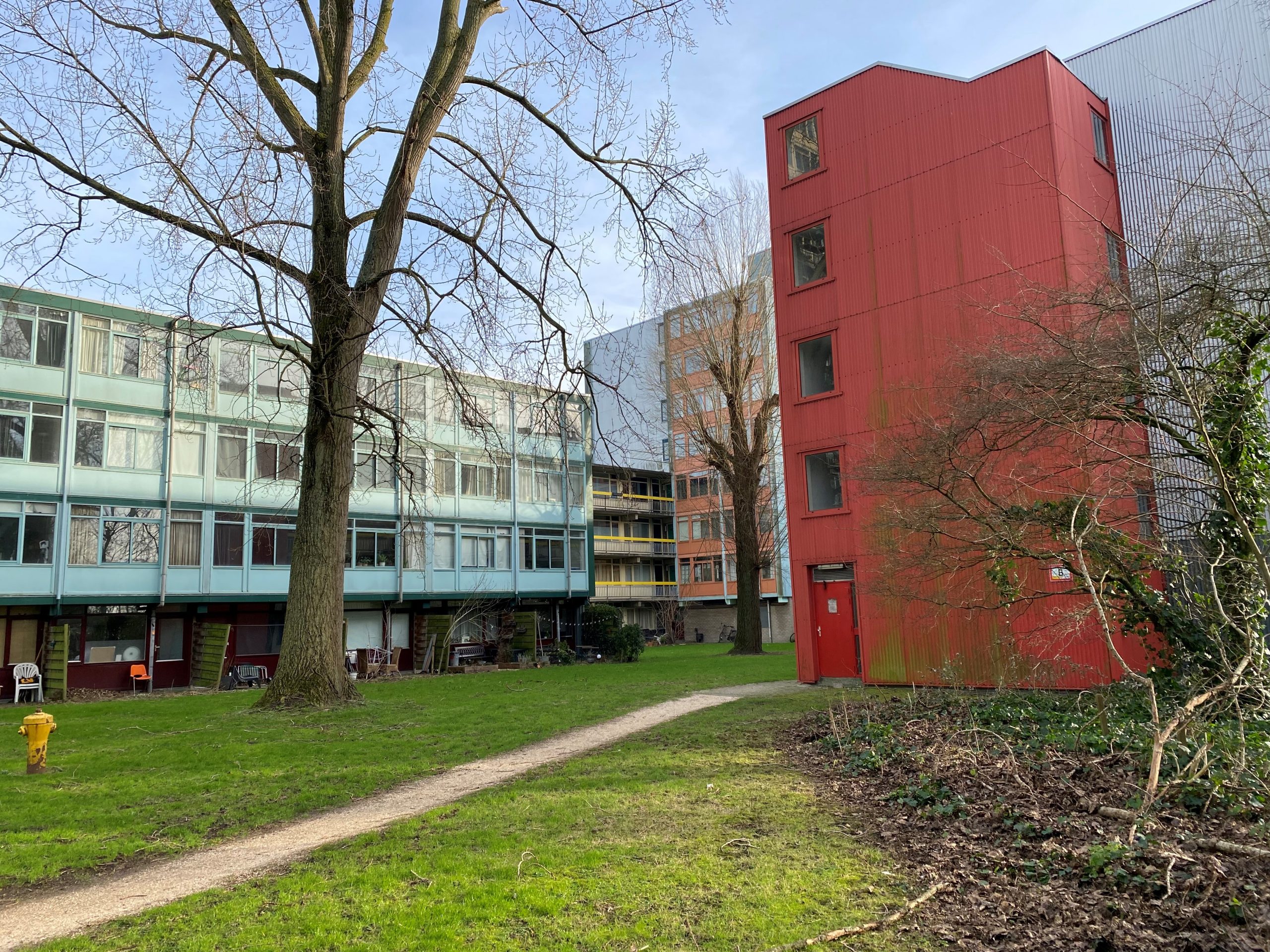The people living around the Van Hasseltlaan feel wronged by student housing provider Duwo’s building and renovation plans. “I am having sleepless nights because of it,” says one of them.
The student complex consists of several high and, as shown here, low apartment buildings. (Photo: Annebelle de Bruijn)
“Look how beautifully green it is here,” says Delft resident Frans, pointing to the trees and bushes that surround his terraced house in the Verzetsstrijders neighbourhood. Frans – who would rather not have his full name appearing in the media – lives some metres away from the student flats on the Van Hasseltlaan. The complex comprises a group of low rise buildings from the 1970s located on a grass field and surrounded by lawns with trees and bushes. “We never have any problems from the student flats,” he says.
But this is likely to change. Duwo, the student housing provider, has plans to build more than 500 additional student houses and a free standing garage on the Van Hasseltlaan. The people living in the area heard that the building work will last eight to 10 years. “This means that a lot of the green will disappear and that we will live next to a noisy construction site for the next decade or so,” says Frans. He does not understand this at all. “The Netherlands already has so little nature, so keep your hands off any green.”
Angry letters
Frans is not the only one by far that is worried about the building plans, as transpired from the stack of letters that residents sent to the Municipality of Delft. Ilse Thijsse too is intending to pick up pen and paper. If the plans go ahead, she will look over a multi-storey garage for students. “Duwo claims that an underground garage is too expensive. The plans are crazy,” she says. Elletje van Workum, who lives a few doors down, will also look over the 15 metre high garage. “Car headlights will shine inside our house every day.”
Student accommodation provider Duwo plans to build new housing for students and first time job seekers on the Van Hasseltlaan and ‘enclose’ existing buildings. The latter involves creating more living space by renovating existing buildings and redesigning their living area. The complex will expand the number of homes from 700 to about 1,200. A multi-storey parking garage is also on the cards.
The Van Hasseltlaan currently has two access roads, but the building plans will reduce this to one, the Wilhelminalaan. This too is a thorn in eye for Thijsse and Van Workum. Thijsse says that “The street is already so narrow and the adjacent intersection busy. This will be a major bottleneck during rush hour.”
Thijsse has carefully saved every bit of information about the Van Hasseltlaan in a file. There is not a lot to date as she has only received one letter from Duwo. The letter – which Delta has seen – only states that the work concerns renovation and not that new houses will be built. “After that everything was online,” she sighs while showing a print of an internet page. “I don’t call this communications as not everyone is digitally adept.”

‘No say’
Thijsse is mostly angry about her opportunity – or lack of it – to have a say. She says that there was no conferring whatsoever, which is required in these types of plans. Thijsse says that a residents’ evening held at the end of November was mostly intended to ‘prepare residents’. A resident of the adjacent Gebbenlaan – she would rather not give her name – agrees. “The plan was forced down our throats.”
Four other residents are so concerned that they are setting up an interest group. They call themselves the kartrekkers (initiators). Delta spoke to three of them. They too view the participatory process as having had wool pulled over their eyes. “We understand that students are facing a housing shortage and that student rooms must be built somewhere,” explains neighbourhood resident Peter Dekker, speaking for them, “only, a participatory process means being involved at an early stage and this was not the case.”
Sleepless nights

Dekker refers to the planuitwerkingskader (PUK) (in Dutch, framework for the plan) in which the Municipality of Delft sets guidelines for the Van Hasseltlaan. Dekker says that these involve far reaching options. The plan mentions the removal of green in the surrounding park and the proposed parking garage. The report states that in response to the residents’ questions at the residents’ evening about why they had no say in the PUK, the Municipality said that it assumes that Duwo was taking care of the participatory process. “Duwo presented us with an almost completely worked out plan and model that evening. There was no opportunity to discuss it whatsoever.”
Dekker says that it is giving him sleepless nights. He is concerned about the plans themselves, the duration of construction, and the way in which he is being treated. “In a completely indifferent tone, we are informed that the construction will take eight to 10 years. This means that we will have to live amid noise for years, and have to deal with all the psychosocial consequences.”
He feels let down and this is affecting him. “I am a civil servant too and that is why it is important to take citizens seriously. We are being completely bypassed.”
Some of the neighbourhood residents have had contact with WijWonen, the organisation that represents Duwo tenants. “Luckily contact with the neighbourhood is good,” says Board Member Sten van Vliet. “We hope that we will reach an agreement with the neighbourhood as we do not agree on some things, like the number of homes that need to be built there.” Next week Delta will publish an article about what the building plans mean for students.
A second residents evening is planned for Thursday 1 February and a third and last one will be held in April. In the meantime, Dekker and the three other kartrekkers have set their sights on Alderman Karin Schrederhof (Housing, the PvdA political party). They requested a meeting with her and a date has been set. “Hopefully she is prepared to really listen to us and is not just meeting us because she has to as part of her duties,” says Dekker.
Delta asked Duwo to what extent the plans are definitive, but the housing provider did not want to go into this at present.
Delta also asked Duwo about the participatory process and the communications with the residents. The housing provider sent the response below, which Delta shortened.
‘The Municipality has issued a Planuitwerkingskader (PUK) for this project and instructed Duwo to involve the immediate neighbours in working towards a plan. In line with the issued frameworks, Duwo had the first draft of a sketch made. This was a good opportunity to invite the neighbourhood for the first neighbourhood meeting, held in November last year.
At the start of the process in November 2023, we sent a letter to those in the immediate area who look over the complex. The residents who missed this, or who we were unable to reach with our first letter, can sign up for a newsletter on this project on duwo.nl/vanhasseltlaan. Like most organisations and their contacts, our preference is for digital communication. Communications on the website, an online newsletter and messages mean that we can communicate/respond faster and keep the information up to date. In terms of the environment, it also reduces transport and paper. By coincidence, the new duwo.nl website was launched last week. This meant that a few links unfortunately did not work temporarily.
- The surnames of the people in this article are known to Delta’s Editorial Office.
Do you have a question or comment about this article?
a.m.debruijn@tudelft.nl


Comments are closed.